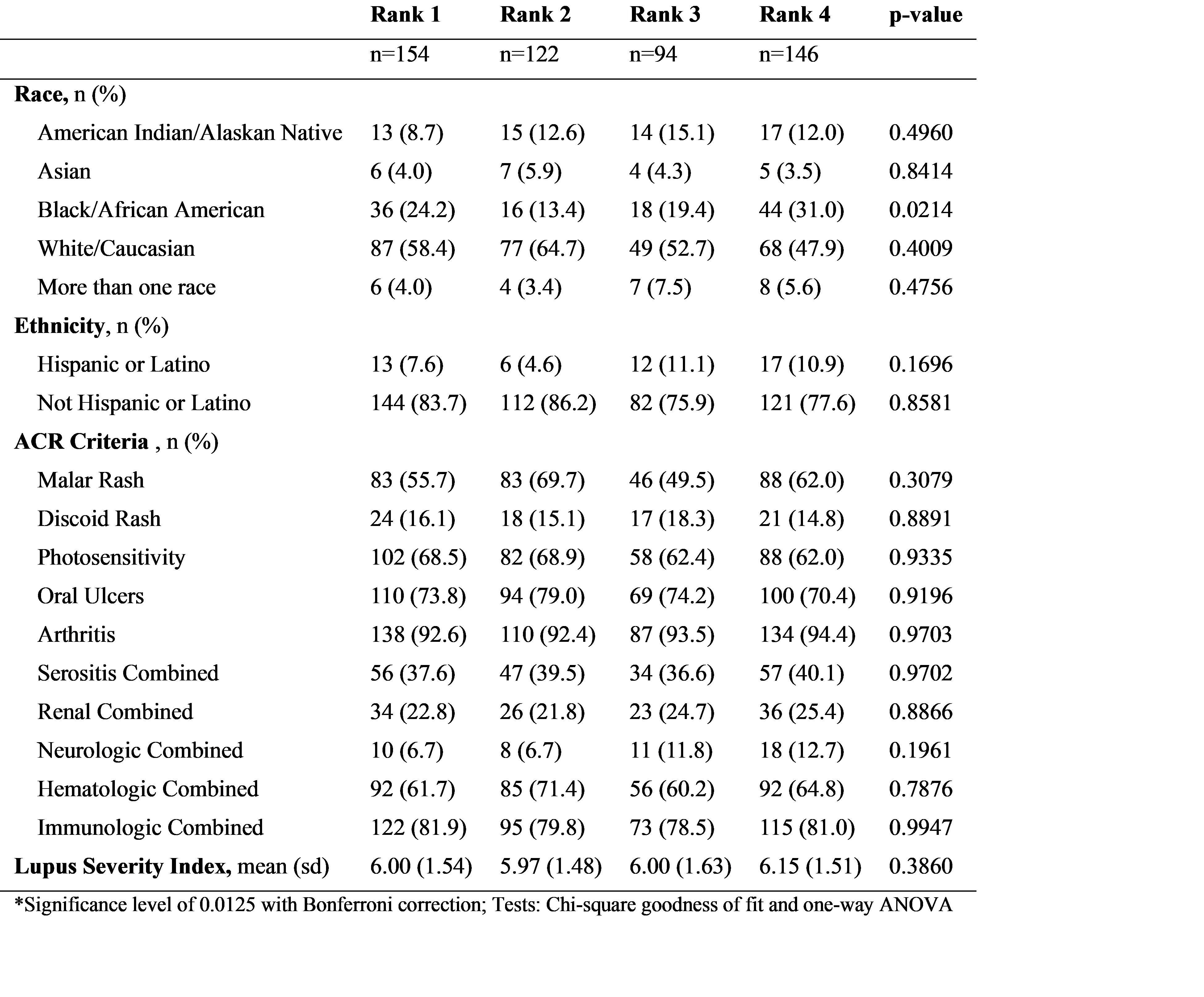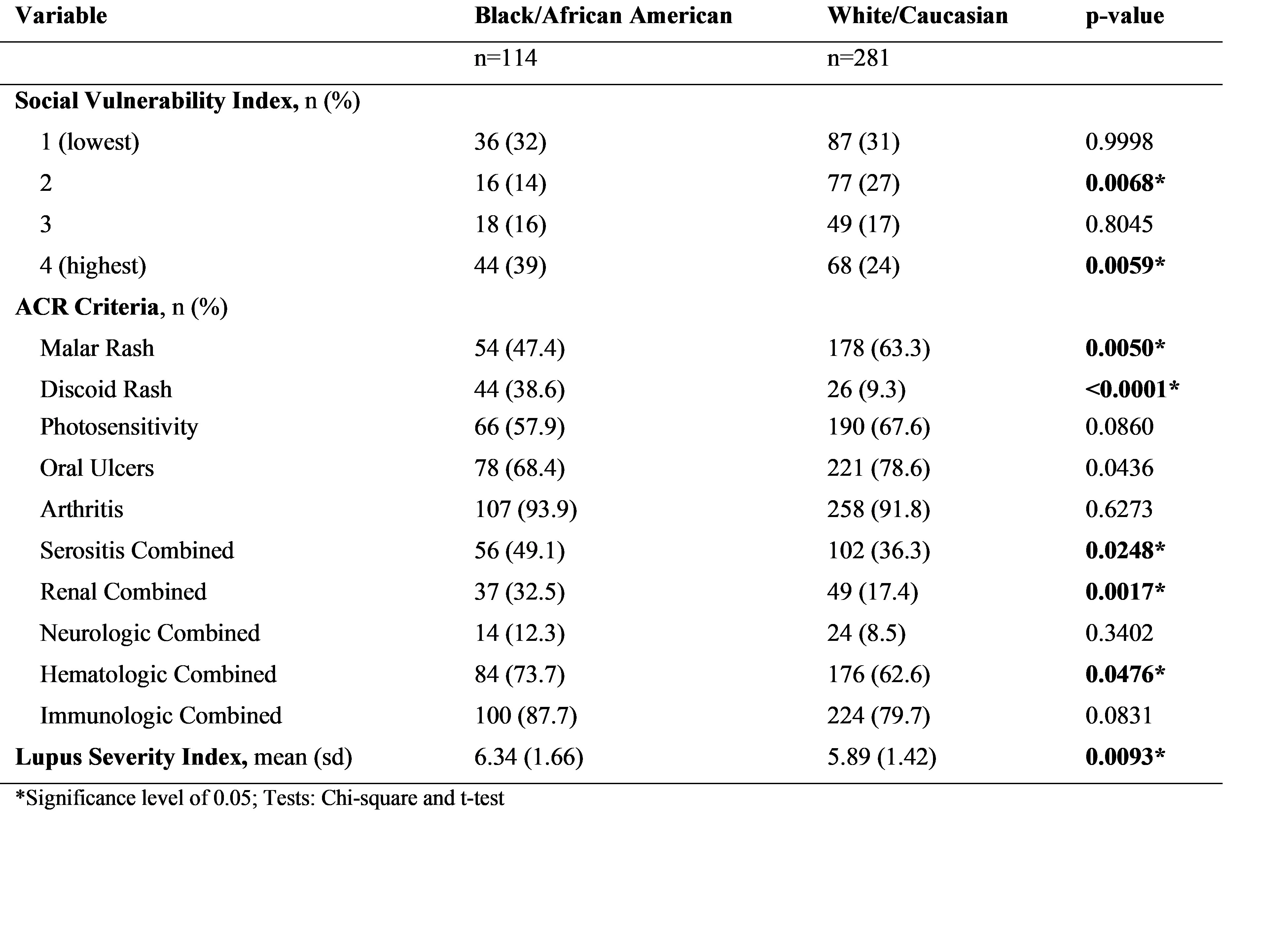Session Information
Session Type: Poster Session A
Session Time: 10:30AM-12:30PM
Background/Purpose: Systemic lupus erythematosus (SLE) is a complex autoimmune disease that disproportionately affects young women of certain racial and ethnic minority groups with enhanced severity and early mortality. Adverse social determinants of health also negatively impact SLE outcomes, which may confound some associations of disease severity with race and ethnicity. However, in many clinical settings and historical cohorts, measures of social determinants of health are missing or incomplete. This exploratory study assessed whether the Center for Disease Control’s Social Vulnerability Index (SVI) is a potential contributing factor to the higher prevalence and severity of SLE among some underserved groups.
Methods: Female patients from the Oklahoma Cohort of Rheumatic Disease (OCRD), a longitudinal cohort of unique patients who meet ACR, SLICC, and ACR/EULAR classification criteria for SLE, were used in this analysis (n=516). A Lupus Severity Index (LSI) was determined by the Montgomery method (Bello et al. Lupus Science Medicine 2016). The SVI for 2020 was categorized into four groups as defined by the CDC: Rank 1 (least vulnerable) to Rank 4 (most vulnerable). Descriptive statistics were computed for OCRD SLE female patients by SVI rank and race, focusing on White and Black SLE patients due to small sample sizes in the other racial groups. OCRD White and Black female patients were compared to Oklahoma’s average female population based on 2020 Census Bureau data.
Results: Among the OCRD patients, the LSI and distribution of ACR criteria did not differ based on SVI rank (Table 1). However, the LSI was significantly higher in Black patients compared to White patients (p=0.0092), and a higher percentage of Black patients were classified as Rank 4 on the SVI (p=0.0059; Table 2). ACR criteria also differed based on race, with a higher percentage of Black patients experiencing discoid rash, serositis, renal, and hematologic manifestations and a lower percentage of Black patients experiencing malar rash (Table 2). In addition, the distribution of SVI ranks significantly differed in Black OCRD patients compared to the average Black female Oklahoma population (Figure 1; p< 0.0001). Notably, a higher percentage of OCRD patients were classified as Rank 1 compared to the general population, with a similar percentage also classified as Rank 4. The distribution of SVI rank in White patients was similar in both populations (Figure 1).
Conclusion: In the OCRD, Black female patients experienced more severe disease, and a higher percentage was classified as socially vulnerable compared to White female patients, suggesting that adverse social determinants of health may contribute to increased severity in this population. Even though referral patterns to the cohort include uninsured, underinsured, and insured patients, significant differences in the SVI ranks were identified between Black OCRD patients and the Black female Oklahoma population, perhaps influenced in part by increased indigenous admixture in cohort referral patterns.
To cite this abstract in AMA style:
Reed Z, Howard X, Arriens C, Aberle T, DeJager W, Merrill J, James J. Associations Between Systemic Lupus Erythematosus (SLE) and the Social Vulnerability Index (SVI) [abstract]. Arthritis Rheumatol. 2024; 76 (suppl 9). https://acrabstracts.org/abstract/associations-between-systemic-lupus-erythematosus-sle-and-the-social-vulnerability-index-svi/. Accessed .« Back to ACR Convergence 2024
ACR Meeting Abstracts - https://acrabstracts.org/abstract/associations-between-systemic-lupus-erythematosus-sle-and-the-social-vulnerability-index-svi/



